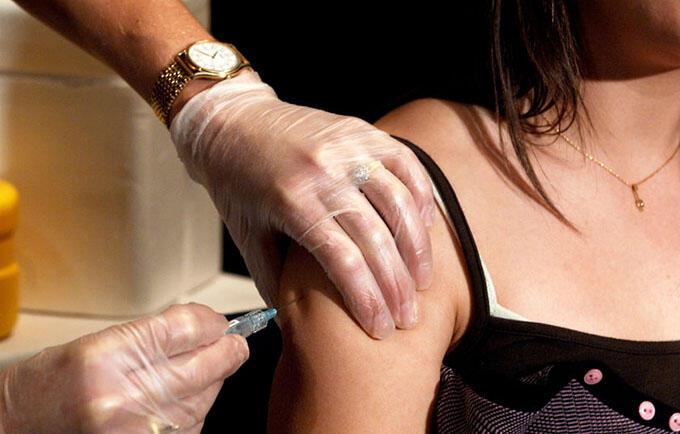ASHGABAT, Turkmenistan – Free HPV vaccination will be introduced in Turkmenistan as part of joint efforts between the government and UNFPA to prevent and treat cervical cancer, the second-most-frequent cancer among women of reproductive age in the country.
The access to free vaccination against human papillomavirus (HPV) will be provided for all 9-year-old girls and boys starting this year in order to help minimise the spread of the common sexually transmitted virus, high-risk variants of which can cause cervical cancer.
‘Introduction of the free HPV vaccination in Turkmenistan demonstrates the country’s commitment to achieving universal access to reproductive health services,’ said UNFPA Assistant Representative Bayramgul Garabayeva. ‘HPV vaccination of adolescents, combined with well-organised screening programmes, can reduce cervical cancer rates by up to 90 per cent.’
UNICEF is also supporting the procurement of the vaccination, which will be administered to students at polyclinics and at schools to ensure maximum coverage. The vaccine offers long-lasting protection against HPV infection and associated diseases, including cervical cancer. The World Health Organization recommends that it be administered to adolescents between the ages of 9 and 13 who have not yet become sexually active.
UNFPA is working with the Ministry of Health and Medical Industry of Turkmenistan to establish the necessary mechanisms and build the capacities required to progressively implement the National Strategy on Response to Cervical Cancer and Breast Cancer Prevention. Adopted in 2010, this strategy outlines specific activities aimed at early detection and treatment. Over the past six years, a series of interventions have contributed to national capacity development in the area of cervical cancer, including trainings on visual inspection of the cervix and on colposcopy and cytology.
This month, modern methods for providing cervical cancer treatment and care were presented to oncologists and gynaecologists in a workshop organised by UNFPA and the Ministry of Health with support from the Embassy of Israel in Turkmenistan.
‘Standardising delivery of quality care for cervical cancer is important in order to manage cases diagnosed through screening,’ said Dr. Kemal Goshliyev, UNFPA Reproductive Health National Programme Officer. UNFPA is providing advisory support to the Health Ministry on equipment procurement and establishing algorithms for effective care.
UNFPA is also providing technical support for developing effective screening programmes and setting up a National Cervical Cancer Registry to improve data collection. The registry will monitor long-term trends in disease incidence and help assess the long-term impact of both HPV vaccination and cervical-cancer screening and treatment programmes.
‘According to World Health Organization data, more than 20 million new cases of cancer are predicted worldwide in 2025,’ said public-health expert Dr. Jonathan Dubnov, who was invited to Turkmenistan to help national specialists establish the registry. ‘Population-based cancer registries are a core component of cancer-control strategies today. The registry serves as the evidence base for decreasing the cancer disease and mortality cases.’
The availability and reliability of disaggregated data on cervical cancer will be improved by establishing a registry that meets international standards.
Data on cancer is one of the four areas set to be addressed under a recent Ministry of Health order on improving data collection. UNFPA will continue working closely with the ministry within the framework of the fourth Country Programme 2016-2020 on improving the quality of data and evidence-based analysis in the area of reproductive healthcare, including cervical cancer.
Photo credit: Art Writ. Used under Creative Commons license CC BY-NC 2.0.



